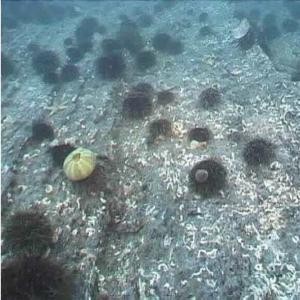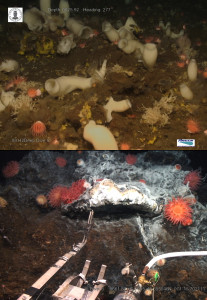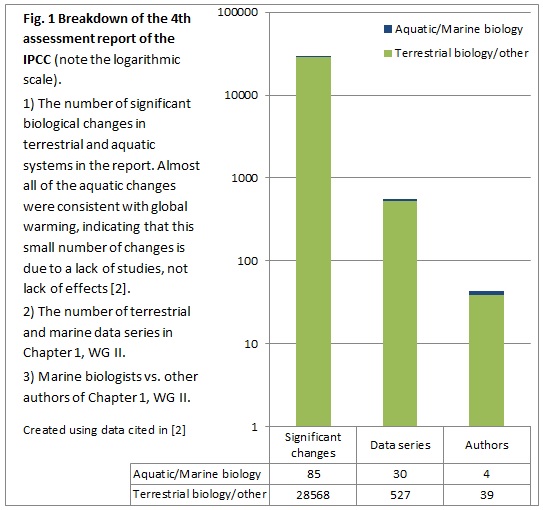Out of sight, out of mind? Ecological change in the oceans
The oceans are greatly impacted by anthropogenic inputs, but are under-sampled. Despite indications that marine species appear to be responding as or more rapidly to global change than terrestrial species [1], only 11% of studies in the fields of ecology, conservation biology and biodiversity (1996-2004) concerned marine systems, and this is evident in large syntheses such as IPCC reports (Fig. 1; [2]). Well-known and widespread drivers of ocean change are overfishing, acidification, nutrient pollution and global warming, but there are many others [3] which receive less attention. These could lead to rapid ecosystem change, altering the provision of services we depend on such as food, water purification, or habitat for fished animals.
We understand ecological change in some marine systems fairly well. For example, kelp forests provide habitat for many seaweeds and animals, but can abruptly change into ‘barrens’ – mostly bare rock. Overfishing is an important driver – once it reaches a certain level, predators (such as cod or lobsters) become too rare and the urchin population explodes, eating all the kelp and preventing regrowth ([4]; and see this great video clip from the BBC). Coral reefs are another system where we have some understanding of large changes; once ocean acidification reaches a certain point calcification rates of corals will drop rapidly, as will coral survival at around 2 °C warming (see [3] for a summary). If this is combined with overfishing of herbivorous fish and nutrient pollution, a shift from coral to seaweed dominance is likely (e.g. in Florida [5]).

Kelp barrens dominated by urchins. Photo: NIVA (http://www.niva.no)
However, much is left to be understood even about well-known systems as we are still not sure how drivers will interact. In some cases, high pressure from one increases the impact of another, but in others, they may resist each other. For example, warming contributes to kelp forest recovery in Norway – the urchins here can only reproduce at cool temperatures, preventing warm forests from being grazed. However, in other areas, climate change negatively affects kelp forests by putting thermal stress on the kelp [6], or allowing warm-adapted urchins to expand their range [4].

Deep-sea sponges and anemones filmed from remote operated vehicles. Photos from the Centre for Geobiology, University of Bergen, Norway (http://www.uib.no/en/geobio)
We are much more in the dark about other ecosystems. The deep sea is still vastly under-sampled – we know little about what is there in the first place, let alone how it may be changing. But what we do know is that it is not the species-poor, barren landscape that it was once imagined to be. For example, there are rich faunas around hydrothermal vents which may be impacted as seabed mining becomes a reality [7,8]. Evaluation of endangered species by the IUCN also reflects lack of marine knowledge – only 9.8% of species on the red list are marine, with many species listed as ‘data deficient’ because it is difficult to get the required level of data for assessment [9]. This is a problem with terrestrial species too, but to a lesser degree than marine species – the result of this is that the extinction rate appears lower than it should be for the oceans [10], which can have effects on conservation priorities.
Some little-understood marine threats also have potentially large consequences. For example, we are aware that there is huge plastic pollution in the oceans but 99% of it is unaccounted for – we just don’t know where it is. There is a possibility that it could be accumulating biologically [11], which could have other serious knock-on effects. Chemical pollution such as PCBs can stick to plastics, thus enter the food chain more easily. PCBs themselves may be related to mass mortality events of fish or marine mammals, by increasing their susceptibility to infectious disease [12].
Conservation of the unknown
Some reasons for the lack of knowledge are practical difficulties in getting observations, poor sampling, lack of funding, and the gap between marine and terrestrial ecology [2]. These issues will have to be tackled if specific, knowledge-based conservation strategies are desired. This is possible already in some well-studied systems, where processes are sufficiently understood to allow ecosystem services-based approaches to management [e.g. 13]. For other systems, good goals could be to get knowledge to a level where we can improve the red-list for marine species, and estimate thresholds of human impacts under which ecosystems are ‘safe’. These have the advantage that they give limits and categories, which are easily communicable to policy-makers. Ways of doing this with little data may have to be developed; for example, assessing which species are threatened based on human impacts and species distribution rather than detailed, hard to get knowledge about numbers [9]. The precautionary principle can also be used – limitation of an activity because it is suspected to cause harm – but in a world where resources are limited and there is money to be made from using the environment, this can be hard to justify without enough facts.
Caroline S. Armitage
References
[1] Poloczanska ES, Brown CJ, Sydeman WJ, Kiessling W, Schoeman DS, et al. (2013) Global imprint of climate change on marine life. Nature Clim Change 3:919-925
[2] Richardson AJ, Poloczanska ES (2008) Under-Resourced, Under Threat. Science 320:1294-1295
[3] Duarte CM (2014) Global Change and the Future Ocean: A Grand Challenge for Marine Sciences. Frontiers in Marine Science 1:1-16
[4] Ling SD, Johnson CR, Frusher SD, Ridgway KR (2009) Overfishing reduces resilience of kelp beds to climate-driven catastrophic phase shift. Proceedings of the National Academy of Sciences 106:22341-22345
[5] Trivedi, B.P. (2001) Why is seaweed killing Florida’s coral reefs? National Geographic News: http://news.nationalgeographic.com/news/2001/08/0823_TVseaweed.html [Accessed 10.02.2015]
[6] Rinde E, Christie H, Fagerli CW, Bekkby T, Gundersen H, et al. (2014) The influence of physical factors on kelp and sea urchin distribution in previously and still grazed areas in the NE Atlantic. PLoS ONE 9(6) DOI: 10.1371/journal.pone.0100222
[7] Moskvitch, K. (2014) Health check for deep-sea mining. Nature 512(7513).
[8] Shukman, D. (2014) Deep sea mining licences issued. BBC News: http://www.bbc.com/news/science-environment-28442640
[9] Peters H, O’Leary BC, Hawkins JP, Roberts CM (2015) Identifying species at extinction risk using global models of anthropogenic impact. Global Change Biol 21:618-628
[10] Webb, T. and Mindel, B.L. (2014) Global patterns of extinction risk in marine and non-marine systems. Current Biology 25:1-6.
[11] Chen, A. (2014) Ninety-nine percent of the ocean’s plastic is missing. Science magazine, June 2014: http://news.sciencemag.org/environment/2014/06/ninety-nine-percent-oceans-plastic-missing [Accessed:09.02.2015]
[12] Handoh, I.C., Kawai,T. (2014) Modelling exposure of oceanic higher trophic-level consumers to polychlorinated biphenyls: Pollution ‘hotspots’ in relation to mass mortality events of marine mammals. Marine Pollution Bulletin 85(2):824-830
[13] Rogers A, Harborne AR, Brown CJ, Bozec Y-M, Castro C, et al. (2015) Anticipative management for coral reef ecosystem services in the 21st century. Global Change Biol 21:504-514

Thank you for an interesting topic.
I agree with that we should get more evidence of impact of, for example deep sea mining. Because I think we do not know how severe the impact of this could be.
But if I needed fast money to get my family living, then I understand extremely well why taking the environmental risk. And since richer people do not want to get poorer, they will keep up the competition by doing exactly the same. Therefore I think it will be extremely hard to get approval for change in the natures favor, even with good facts and evidence about environmental changes.
Hi, thanks for your comment. I think it is true that people will mostly act in their own interests. Therefore I wonder if a more ‘ecosystem services’ based approach will be more convincing in the future. For example, instead of saying «We need to limit overharvesting of lobsters because they help keep kelp forests intact, thus high biodiversity» – one could say «we need to limit overharvesting of lobsters because they help keep kelp forests intact, which are important habitats for juvenile fish of many important commercial species».
Thank you for shedding some light on ecological change in the oceans.
You write that,
«only 11% of studies in the fields of ecology, conservation biology and biodiversity (1996-2004) concerned marine systems, and this is evident in large syntheses such as IPCC reports (Fig. 1; [2]).»
This was quite surprising, considering that the oceans are a large part of our planet and host a great number of species. It is evident that more research is needed.
I agree with you that the precautionary principle, although it should be enough, is not as convincing as arguments focusing on ecosystem services.